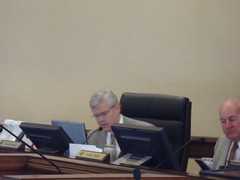Why is Lowndes County Chairman Ashley Paulk decrying alleged privatization of Moody Air Force Base while promoting actual privatization of a basic Lowndes County public service, trash collection?
Jason Shaefer wrote for the VDT 5 December 2012, County disagrees with proposed zoning amendment,
Paulk alleged Moody’s intervention has prevented development before—the establishment of a small schoolhouse within a church near the base, for example, he said. He told the committee that Moody had 30,000 acres to the east on which to build, and that the air base has become “privatized.”
According to the free dictionary:
pri·va·tize: To change (an industry or business, for example) from governmental or public ownership or control to private enterprise:
And yet at the
upcoming commission meeting,
Chairman Paulk will ask the commissioners to vote on this agenda item:

8.b. Exclusive Franchise Agreement for Residential Solid Waste Collection Services with Advanced Disposal Services of Central Alabama, Inc.
 Seems to me that’s a privatization of one of our own county governmental
services.
Perhaps the commissioners will reconsider the “curbside only
by a private firm” path they are on and conduct some public hearings in an
effort to understand what the citizens might want in solid waste disposal.
Seems to me that’s a privatization of one of our own county governmental
services.
Perhaps the commissioners will reconsider the “curbside only
by a private firm” path they are on and conduct some public hearings in an
effort to understand what the citizens might want in solid waste disposal.
-gretchen









